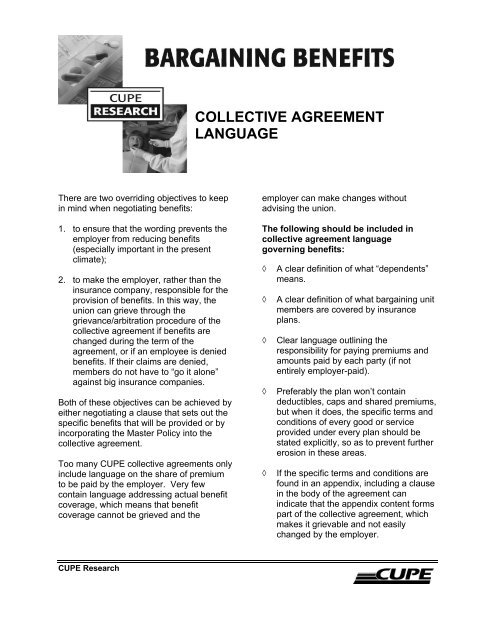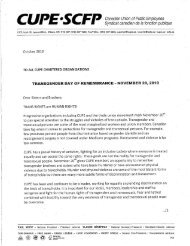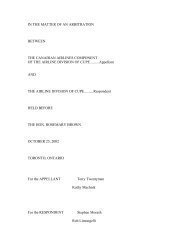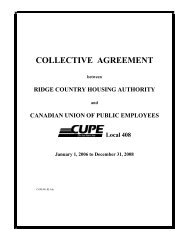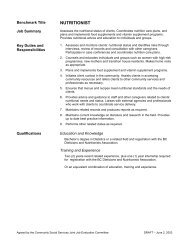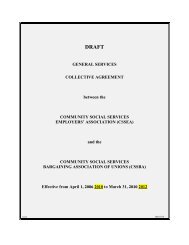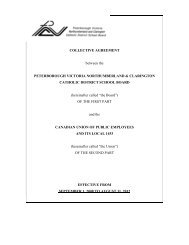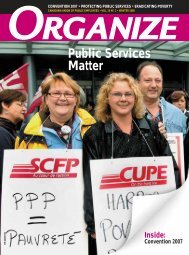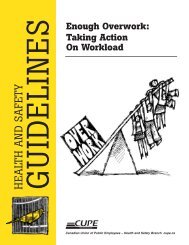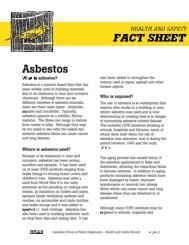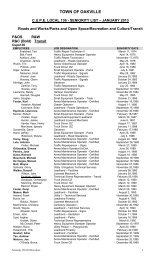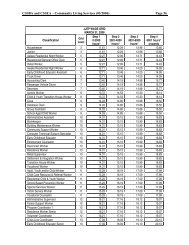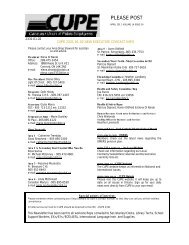COLLECTIVE AGREEMENT LANGUAGE - Canadian Union of ...
COLLECTIVE AGREEMENT LANGUAGE - Canadian Union of ...
COLLECTIVE AGREEMENT LANGUAGE - Canadian Union of ...
Create successful ePaper yourself
Turn your PDF publications into a flip-book with our unique Google optimized e-Paper software.
<strong>COLLECTIVE</strong> <strong>AGREEMENT</strong><strong>LANGUAGE</strong>There are two overriding objectives to keepin mind when negotiating benefits:1. to ensure that the wording prevents theemployer from reducing benefits(especially important in the presentclimate);2. to make the employer, rather than theinsurance company, responsible for theprovision <strong>of</strong> benefits. In this way, theunion can grieve through thegrievance/arbitration procedure <strong>of</strong> thecollective agreement if benefits arechanged during the term <strong>of</strong> theagreement, or if an employee is deniedbenefits. If their claims are denied,members do not have to “go it alone”against big insurance companies.Both <strong>of</strong> these objectives can be achieved byeither negotiating a clause that sets out thespecific benefits that will be provided or byincorporating the Master Policy into thecollective agreement.Too many CUPE collective agreements onlyinclude language on the share <strong>of</strong> premiumto be paid by the employer. Very fewcontain language addressing actual benefitcoverage, which means that benefitcoverage cannot be grieved and theemployer can make changes withoutadvising the union.The following should be included incollective agreement languagegoverning benefits:◊◊◊◊◊A clear definition <strong>of</strong> what “dependents”means.A clear definition <strong>of</strong> what bargaining unitmembers are covered by insuranceplans.Clear language outlining theresponsibility for paying premiums andamounts paid by each party (if notentirely employer-paid).Preferably the plan won’t containdeductibles, caps and shared premiums,but when it does, the specific terms andconditions <strong>of</strong> every good or serviceprovided under every plan should bestated explicitly, so as to prevent furthererosion in these areas.If the specific terms and conditions arefound in an appendix, including a clausein the body <strong>of</strong> the agreement canindicate that the appendix content formspart <strong>of</strong> the collective agreement, whichmakes it grievable and not easilychanged by the employer.CUPE Research
Bargaining Benefits 2Other Clauses that can Strengthen the <strong>Union</strong>’s Position include:• Making the plan grievableNegotiating a clause making explicit theemployer’s responsibility (rather than theinsurance company’s responsibility) for theprovision <strong>of</strong> benefits helps to ensure that theemployer can’t blame the insurancecompany for cuts or reduced services.Here are some examples:Subject only to Schedule “F” [dental plan and group life insurance], theEmployer has the sole responsibility for all aspects <strong>of</strong> the administration <strong>of</strong> thehealth and welfare benefit plans.”[CUPE Local 1004 and City <strong>of</strong> Vancouver]“The Employer is responsible for the administration and application <strong>of</strong> the planreferred to in Article x and any difference arising with respect thereto will bedisposed <strong>of</strong> in accordance with the grievance and arbitration procedures <strong>of</strong> thisagreement.”[BCGEU and Legal Services Society]“The Employer and not the insurance Carrier, shall be responsible for allprotections provided.”[SEIU and Brookhaven Nursing Home]CUPE Research
Bargaining Benefits 3• Protecting against unilateral changesNegotiating a clause that ensures thatchanges cannot be made to insurance planswithout the consent <strong>of</strong> the union furtherensures that the employer cannot take awaymembers’ benefits during the term <strong>of</strong> thecollective agreement. Here are someexamples:“If the BRC [Benefits Review Committee] unanimously recommends changesto the Benefits Plan … they will provide these recommendations to Local 4400,CUPE and the Board. Thereafter, Local 4400, CUPE and the Board may agreeto amend the Collective Agreement …”[CUPE Local 4400 and Toronto School Board]“It is agreed and understood by the parties signatory to this agreement that theGroup Welfare Plans form part <strong>of</strong> the Collective Agreement, and may only bealtered or amended by mutual agreement <strong>of</strong> both parties.”[C.E.P. and Nova Scotia Forest Products Industries]CUPE Research
Bargaining Benefits 4• Protecting cost saving measuresWhen negotiating cost saving proposals it isimportant to ensure that access is notundermined. Below is a clause thatinstitutes a mail order pharmacy but stillensures employees access to a regularpharmacy for some situations.“Effective September 1st, 1999, the Major Medical Insurance Plan will beamended to provide that employees are required to use Medi-Trust to supplythe prescribed drugs covered under the drug plan. The drug plan will not coverdrugs supplied by a pharmacist other than Medi-Trust except in the two (2)circumstances specified below:a) In the event that a physician prescribes a drug which is covered under thedrug plan <strong>of</strong> the Major Medical Insurance Plan and Medi-Trust cannot supplythe prescribed drug or a generic substitute for the prescribed drug, theemployee may have the prescription filled by an alternate pharmacist.b) In the event <strong>of</strong> an emergency a physician prescribes in writing a drug whichis covered under the drug plan <strong>of</strong> the Major Medical Insurance plan andprescribes, in writing, it is medically necessary that the prescription must befilled in a shorter time frame than the time frame in which it can be supplied byMedi-Trust, the employee may have the prescription filled by an alternatepharmacist. In such event, the employee must provide the Employer and theCarrier with a written certification by the physician that the prescription must befilled immediately and cannot medically wait the time required by Medi-Trust tosupply the drug. In such case, the employee will pay the dispensing fee for theprescription and such dispensing fee will not be covered under the Plan.[CUPE Local 132-01 and the Sunnycrest Nursing Home Limited expiry March31/ 2004]CUPE Research
Bargaining Benefits 5• Substitute <strong>of</strong> CarrierDuring the term <strong>of</strong> the collective agreement,the employer may wish to change insurancecarriers. If the change results in a reductionin benefit costs the union may support sucha change. However, careful wording helpsprotect members from cuts to coverage.Many CUPE collective agreements containonly very general language stating that newplans must be at least equal to existingones. “Equal” may be interpreted as theoverall dollar value <strong>of</strong> the new plans, whichallows employers to change the actualbenefits provided.Contract language such as the examplesabove should prevent plan changes unlessthere is mutual agreement. Another optionis a clause, similar to the following, in whichthe union has to approve new insuranceplans resulting from a change <strong>of</strong> carriers:“No carrier will be changed without prior approval <strong>of</strong> the Local <strong>Union</strong> on anyplans.”[CUPE Local 4435 and The Corporation <strong>of</strong> the County <strong>of</strong> Haliburton]• Employer Savings From Insurance PlansEmployers sometimes receive monies frominsurance carriers for premium deductionsor rebates, money that could be used toreduce costs or enhance benefits.Unfortunately, some employers hide thesesurpluses. One way to stop such abuses isto negotiate protections in the collectiveagreement such as:“If the Employer underwrites the above group insurance programs with a carrier, heshall give the <strong>Union</strong> notice <strong>of</strong> any dividend, premium reduction, experience rebate orother savings from the plans paid by the Underwriter to the Employer. The Employershall use these dividends, [premium reductions, experience rebates and othersavings] to improve benefits in a manner mutually agreeable to the parties. If there isno agreement between the parties, the matter shall be submitted to arbitration inaccordance with this agreement. “[CUPE Local 4204 and Chimo Youth and Family Services]CUPE Research
Bargaining Benefits 6• Access to InformationIn order to make use <strong>of</strong> benefits when theyare needed, employees must have accessto current information regarding insuranceplans. The easiest way for employees tounderstand their benefits protection is toinclude it in clear language in the collectiveagreement.Regardless, employees should receive abrochure from the employer, outlining theircoverage.The union should always have a currentcopy <strong>of</strong> the Master Policy in order to ensurethat it is being implemented correctly and toreference in the event <strong>of</strong> a grievance:“Employee benefits brochures shall be provided by the Employer to all Employeeswho are eligible for benefits, at time <strong>of</strong> hire or upon request.“[CUPE Local 4400 and Toronto School Board (Office Staff)]“Upon request, the <strong>Union</strong> shall be provided with current copies <strong>of</strong> the MasterPolicies <strong>of</strong> all insured benefits.”[CUPE Local 1321 and Renfrew County DSB Office]“A copy <strong>of</strong> the master contracts with the carriers for the extended health care, dentaland group life plans shall be sent to the President <strong>of</strong> the <strong>Union</strong>.”[BCGEU and Government <strong>of</strong> B.C. (Retail/Warehouse)]CUPE Research
Bargaining Benefits 7• Disclosure <strong>of</strong> informationIn order to challenge the employer’s costestimates, bargaining committees needaccess to plan information such as number<strong>of</strong> employees covered, how many fulltime/part time, costs to date etc. A clause inthe collective agreement can force theemployer to reveal plan statistics and howcost calculations are made.“The Employer shall provide the <strong>Union</strong> with a copy <strong>of</strong> all employee benefit and healthand welfare master plan texts and amendments. In addition, the Employer shall,every two (2) years provide the <strong>Union</strong> with a copy <strong>of</strong> the financial/actuarial valuationfor the pension plan including a list <strong>of</strong> all pension fund investments and holdings, rate<strong>of</strong> return, and all actuarial assumptions used.”[CUPE Local 1063 Manitoba Workers Compensation Board, expiry March 10, 2006]• Benefits for Same Sex PartnershipsIn the definition <strong>of</strong> “dependents” many localshave had success negotiating coverage forsame sex spouses and their families. Hereare two examples:Qualification for and entitlement to benefits shall be governed by plan texts,however, for the purposes <strong>of</strong> this Collective Agreement, "common-lawspouse" shall include same gender partners. All references to, and provision<strong>of</strong> benefits (except the Workers Compensation Board <strong>of</strong> Manitoba RetirementPlan, as limited by statute) for, spouses and family members under theCollective Agreement shall include same gender partners and their families.[CUPE Local 1063 Manitoba Workers’ Compensation Board, exp March 10, 2006]Same Sex RelationshipsAn employee who co-habits with a person <strong>of</strong> the same sex, and whopromotes such person as a "spouse" (partner), and who has done so for aperiod <strong>of</strong> not less than two (2) years, will be eligible to have that personcovered as a spouse for purposes <strong>of</strong> Medical Services, Extended Health andDental benefits and leaves related to family matters. This coverage includesdependents <strong>of</strong> the employee's same sex spouse.[Local 388 and City <strong>of</strong> Victoria, expiry December 3l, 2004]CUPE Research
Bargaining Benefits 8• Joint Insurance Benefits Review CommitteeA joint employer-union benefits reviewcommittee can help to ensure transparencyand accountability in the way benefits areprocured and administered. The followingare some <strong>of</strong> the elements <strong>of</strong> Terms <strong>of</strong>Reference for such a committee:°Committee Composition – theCommittee should be co-chaired byan employer and employeerepresentative, and should have anequal number <strong>of</strong> representativesfrom each party:“The committee shall be composed <strong>of</strong> an equal number <strong>of</strong> representatives fromthe Employer and from the <strong>Union</strong>….At meetings <strong>of</strong> the committee, each partymay be accompanied by a representative to provide technical advice andcounsel.”[CUPE Local 1750 and The Workplace Safety and Insurance Board]°Mandate/Duties <strong>of</strong> the Committee -the greater the committeeinvolvement in the determination <strong>of</strong>the carrier, plan administration andthe monitoring <strong>of</strong> the costeffectiveness<strong>of</strong> plans, the better.• The joint committee could alsopursue the possibility <strong>of</strong> joiningwith other employers orbargaining units to set up amulti-employer benefits plan.Remember that bigger ischeaper because the costs andrisks are shared by a largernumber <strong>of</strong> people.• The committee should also reevaluatethe present carriers andthe costs and services that areentailed with providing thebenefits. Perhaps the benefitsplan can be tendered to see ifother carriers can provide betterservice or do so more cheaply.• In particular, a non-pr<strong>of</strong>it carriersuch as Blue Cross or GreenShield should be considered.Remember, however, that lowercost should not necessarily betraded for an erosion <strong>of</strong> benefitsor service in processing benefitclaims.• The illnesses and injuries <strong>of</strong>employees who are on shorttermor long-term disability couldsometimes more appropriatelybe drawing WorkersCompensation benefits, thustaking pressure <strong>of</strong>f the benefitsplan.• The committee could also look atthe workplace and see ifchanges can be made that willreduce worker stress and fatigueand thereby reduce the demandon the benefit plan.CUPE Research
Bargaining Benefits 9“Duties <strong>of</strong> the Committee:The duties <strong>of</strong> the committee shall consist <strong>of</strong> the following:1. Development <strong>of</strong> the specifications for the public tendering <strong>of</strong> anynegotiated benefits which may be included in the Employee Benefit Plan;2. Determination <strong>of</strong> the manner in which the specifications will be madeavailable for public tendering;3. Consideration and examination <strong>of</strong> all tenders submitted in response to thespecifications for tender and preparation <strong>of</strong> a report thereon;4. Recommendation to the Employer on the selection <strong>of</strong> the insurancecarrier or carriers to underwrite the Employee Benefit Plans;5. Review <strong>of</strong> the semi-annual financial reports on the Employee BenefitPlans; and6. Review <strong>of</strong> contentious claims and recommendations thereon when suchclaim problems have not been resolved through the existingadministrative procedures.The specifications for tender will describe the benefits to be provided, the costsharingarrangement between the employer and its employees in the BargainingUnit, the past financial history <strong>of</strong> the benefit plans subsequent to theestablishment <strong>of</strong> this committee, the employee data, the format <strong>of</strong> the retentionillustration for each coverage and the financial reporting requirements. Tendersshall be entertained by the Committee for any individual insurance carrier actingsolely on its own behalf. This shall not preclude such carrier from arrangingreinsurance as may be necessary.The basis for recommendation <strong>of</strong> an insurance carrier(s) will include the ability <strong>of</strong>the carrier(s) to underwrite the plan, compliance <strong>of</strong> the carrier's quotation with thespecifications for tender, the carrier's service capabilities and the expected longterm net cost <strong>of</strong> the benefits to be provided.[CUPE Local 1750 and The Workplace Safety and Insurance Board expired March 31,2005]CUPE Research
Bargaining Benefits 10°Meetings – language shouldclearly state the frequency <strong>of</strong>meetings, when they occur andthe assurance <strong>of</strong> paid time <strong>of</strong>f forunion members to attend meetingsto ensure the committee has theopportunity to get its work done.“Time at meetings is considered work time. “[CUPE Local 1750 and The Workplace Safety and Insurance Board]°Access to Required Documentation– without the critical information thecommittee will not be able to do itsjob. They need access to thedocumentation (especially the MasterPolicies).“Joint Employee Benefit Plan CommitteeAll employee benefit plans shall be fully negotiable. Accordingly, a joint committee onemployee benefit plans and a joint advisory committee for pensions shall be established tostudy and review all employee benefit and health and welfare plans and to makerecommendations as to improvements as are mutually agreeable. The committees shallhave equal representation from the <strong>Union</strong> and the Employer. Either party may make use <strong>of</strong>technical advisors, as required. The Committee shall have full access to all pertinentinformation concerning the benefit plans.”[CUPE Local 1063 Manitoba Workers Compensation Board expiry March 10, 2006]CUPE Research
Bargaining Benefits 11Benefit costs are rising. But don’t assumerising costs are due to increased use byemployees. In reality, costs are risingbecause <strong>of</strong> four major factors:1. Provincial governments are constantly“de-listing” services from provincialplans. This “de-listing” <strong>of</strong> medicalservices means that citizens withoutinsurance plans have to pay out <strong>of</strong> theirpockets, and those with private benefitsplans see the costs <strong>of</strong> their plansincrease.2. The federal government recently passedlegislation that protects drug companiesfrom competition for 20 years. Thatmeans drug companies have a 20-yearmonopoly on whatever drugs theyproduce, and can set prices withoutcompetition.3. Insurance companies pr<strong>of</strong>its are part <strong>of</strong>the premium cost. And in recent yearsinsurance companies pr<strong>of</strong>its have risensteadily. According to the March 2004issue <strong>of</strong> H.R. Outlook (a newsletterproduced by Mellon), Great-West Lifereported a 28% increase in pr<strong>of</strong>it lastyear; Industrial Alliance finished 2003with a record net income up 39% over2002. Manulife has ten years <strong>of</strong> recordpr<strong>of</strong>its reporting a 12% increase for2003 over 2002. While Sun Lifereported a 31% increase in net incomefor 2003 over 2002.4. Insurance companies are consolidating.There are now only a handful <strong>of</strong>insurance companies, compared tomore than 100 only two decades ago.This consolidation concentrates thesuppliers <strong>of</strong> insurance to only a few, andreduces competition.These cost shifting initiatives have meant that our workplace group insurance plans pickup much <strong>of</strong> these costs. For more information on benefit costs, see the fact sheet called“Overview” in this series.sl/cope491S:\Research\WPTEXT\Bargaining Benefits\CA language.docSeptember 7, 2005CUPE Research


